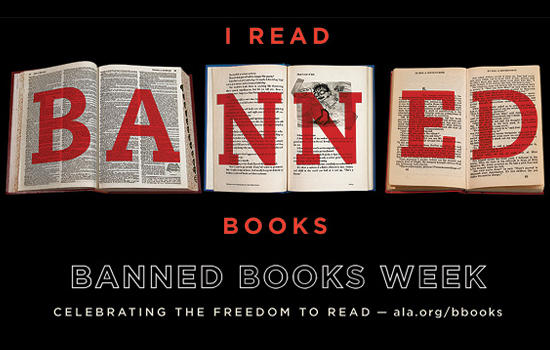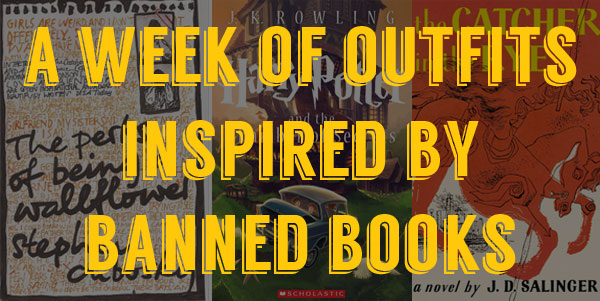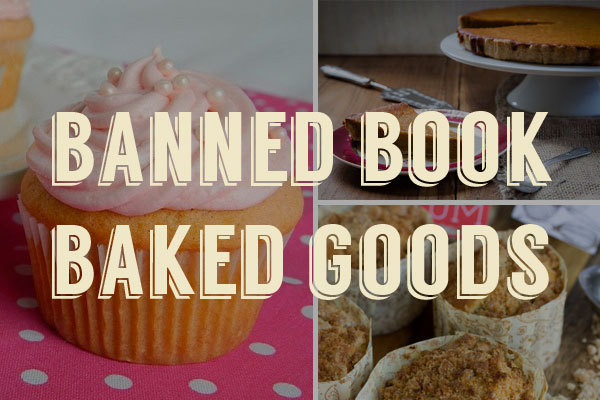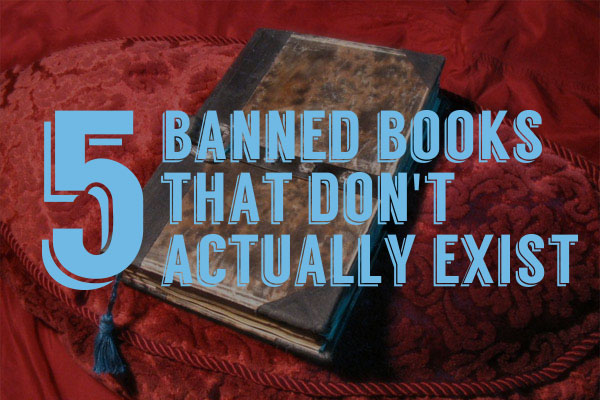Banned Books Week: A YA Survival Kit To Get You Through Banned Books Week
Leaves are falling, pumpkins are plumping, and books are being banned. It must be fall. This year, if you’re going to survive Banned Books Week, I thought I’d provide you with ten essentials featured prominently in ten of the most challenged young adult novels. This way you can arm yourself with the knowledge, and items, that the parents in your community are protecting you from. Because as we all know, if you don’t read about taboo things in books, then of course, they will never affect you.
So get your flashlights, bottled water, and canned goods ready, then be sure to add the following items to your Banned Books Survival Kit.
1. Underpants, preferably white and clean. While having a clean set of underwear is essential for any survival kit—from earthquake to car accident—it’s particularly important if you’re going to survive the banning of the middle grade novel Captain Underpants by Dav Pilkey. It had the honor of coming in as the #1 Most Banned Book of 2013. The series revolves around two fourth graders who pull pranks and take issue with their egomaniacal principal, Mr. Krupp. Thus leading parents to complain about the book’s offensive language, like calling the principal “mean,” and its encouragement “to disobey authority.”
The kicker is, that was exactly Pilkey’s point. He’s stated in interviews that he felt some of the authority figures he knew in grade school were villains, but “none of the children in my school, including me, thought to question them. So, I do feel there is real value in showing kids that not all authority figures are good or kind or honorable.”
Adults who bully? Impossible. So pack your panties and avoid such topics.
2. Basketball, inflated and ready to play. Teens never take their aggressions out on a sporting field, and they always should be discouraged from thinking they could benefit from transferring into a school that might better suit their needs. That’s why you should pack a basketball in your survival kit in honor of The Absolutely True Diary of a Part-Time Indian by Sherman Alexie, which ranked as the #3 Most Banned Book in 2013. Specifically, parents took issue with the drugs, alcohol, smoking, offensive language, racism, and sexually explicit situations encountered by a Native American boy as he attempts to acclimate into an all-white public high school where he joins the varsity basketball team.
This National Book Award winner admittedly tackles tough topics, many pulled from the author’s own adolescence, which led him to comment, “I have yet to receive a letter from a child somehow debilitated by the domestic violence, drug abuse, racism, poverty, sexuality, and murder contained in my book. To the contrary, kids as young as ten have sent me autobiographical letters written in crayon, complete with drawings inspired by my book, that are just as dark, terrifying, and redemptive as anything I’ve ever read."
3. A Cassette Tape, with a retro radio. In 2014, this item might be hard to find for your survival kit. And it might be even harder to find a tape deck to play it on, but that could be why parents so desperately want the item banned from your life. This way you’ll never come home to a box of cassettes detailing exactly why a deceased classmate took her own life and your specific role in her suicide. This powerful theme, along with some references to drugs, alcohol, smoking and sex, is the reason Thirteen Reasons Why by Jay Asher ranked as the #3 Most Banned Book in 2012.
As much as parents justifiably want to prevent their children from ever contemplating suicide, banning books on the subject won’t change the reality. In fact Asher argues the opposite. “The very day I found out 'Thirteen Reasons Why' was the third most-challenged book, I received an e-mail from a reader claiming my book kept her from committing suicide. I dare any censor to tell that girl it was inappropriate for her to read my book.”
4. Cell Phone, duh. If you don’t know the necessity of having a fully charged cell phone in your survival kit, I don’t know what to tell you. Except that maybe you shouldn’t use your precious battery life to text your friends about parties and boyfriends using language some parents deem inappropriate, as is the case with ttyl by Lauren Myracle, the #1 Most Banned Book in 2011.
These books reference many teen issues that parents don’t want to admit, like smoking pot, wearing thongs, and getting caught in bed with a boy. But as Myracle puts it, “One [character] goes to a college party when she’s still in high school. She gets drunk. She gets egged on to take her shirt off. Pictures get taken. I don’t write books to teach lessons, but if a girl can read a story like that and think, ‘Maybe I won’t take off my shirt at a frat party when people have phones there,’ my work is done.”
5. Bow and Arrow. Hey, you never know. It seems like in most post-apocalyptic futures, from The Hunger Games to the TV show Revolution, knowing how to use a bow and arrow could save your life, so be sure to put one in your survival kit. Though if The Hunger Games by Suzanne Collins, #3 Most Banned Book of 2011, is already pulled from your library shelves you might not fully appreciate why this hunting tool is so essential. With its perceived anti-ethnic, anti-family, occult and satanic themes, this book elicits strong reactions from parents.
Collins herself has acknowledged her dystopian stories aren’t for everyone, admitting that, "people were concerned about the level of violence in the books. That's not unreasonable. They are violent. It's a war trilogy." But its interesting to note that most of the challenges came after the movies, leading many to wonder exactly what parents were taking issue with—the books or the films.

6. Switch Blade. A versatile knife could come in handy in many situations, making it a must-have item in most survival kits, but this specific switchblade has been ripped from the pages of Harper Lee’s classic To Kill a Mockingbird. More than 50 years after its initial publication, this Pulitzer Prize winner is still making the top ten most banned lists, hitting #10 as recently as 2011. Most parents question the book’s offensive language and racism, which are rather essential elements when you’re writing a novel set in a small Alabama town, during the Great Depression, featuring a young black man who’s accused of raping a white woman.
It’s an iconic story told from the point of view of a child surrounded by adults with such heightened, racially-charged emotions that one man is willing to threaten the kids with a switchblade at the end, ultimately leading to his own demise. In 2014, it’s amazing that this highly acclaimed novel is still one of the most banned, proving that when it comes to stubborn ignorance, history can’t always prove you right.
7. Baseball Glove, and a corresponding baseball because that only makes sense. If you’re going to have a basketball in your survival kit, then it’s only fair to include a baseball and mitt, as well. You can’t ban one without the other. Only this mitt is in reference to The Catcher in the Rye by J.D. Salinger, which is still rocking the Top Ten most banned lists despite having been published in 1951. In fact, it hit #6 as recently as 2009, mostly because of “offensive language unsuited to the age group.” As we all know, teens never curse.
Included on Time’s list of the 100 best English-language novels, the book features main character, Holden Caulfield, who writes about his late brother’s baseball glove and then goes on to fantasize about becoming a "catcher in the rye," symbolically saving children from the evils of adulthood. Holden wants to stop children from losing their innocence, which is ironic given that’s exactly what the censors are trying to do by banning this very novel.
8. Chocolate Bar, preferably full sized. You gotta eat, so why not stock your survival kit with candy bars in honor of The Chocolate War by Robert Cormier, a 1972 novel that still ranked as the #10 most challenged book in 2009. That’s a lot of decades of banning, with parents claiming the book features offensive language, sexual situations, and violence. Essentially, Cormier was writing about bullying before it was trendy to do so, and he’s still being criticized for it. His main character, Jerry, dares to refuse to participate in the chocolate bar fundraiser at his Catholic high school, leading to violent altercations with classmates and extreme abuse of power by the school administration.
Cormier, a Catholic school grad, was reportedly inspired to write the book after his son refused to sell candy at his Catholic school. He defended his book and its explicit language until he died, stating that teens aren’t “looking for titillation, they're looking for validity. The language is just enough to suggest that this is the way kids talk." If parents spent any time on teen chat rooms, they’d know he’s right.
9. Tree—plastic, artistic, or bonsai, whatever fits. While this might be a tough item to cram into your survival kit, it’s definitely an essential if you’re going to survive the banning of the YA novel Speak by Laurie Halse Anderson. Ranked as #60 on the Top 100 Most Banned Books for 2000-2009, the novel is a cautionary tale about the emotional aftermath of rape. Thus, the fact that it features “sexual situations” should come as no surprise to parents, yet they still continue to challenge it, also referencing the book’s cursing and alcohol use. This particular novel centers on speaking up when you’re sexually assaulted, with the main character finding her voice only after an entire school year spent emotionally withdrawn with her only outlet being an art class where she’s devoted to the topic of “trees.”
Obviously, parents don’t want their daughters to experience rape, but that doesn’t make the subject unsuitable. Halse Anderson explains that, “When Speak was published, there was some whispering that this was not an appropriate topic for teens. I knew from my personal experience that it was. This notion was validated by thousands and thousands of readers who connected with me to thank me for the book. They said it made them feel less alone and gave them the strength to speak up about being sexually assaulted and other painful secrets.”
10. Maxi Pad, no belt required. If your survival kit is going to have to last you more than 28 days and you’re a female, then tampons and pads are an unfortunate necessity. One many of us learned about from the Judy Blume novel Are You There, God? It’s Me, Margaret, which was #99 on the Top 100 Most Banned Books for 2000-2009. It should be noted that Blume has four other books in the top 100, including Forever, which was still ranking as #2 as recently as 2005. This makes Blume second only to Stephen King as the most banned author in American history.
Seriously. Judy Blume and maxi pads are what parents are objecting to most. I find this crazy. Blume is the godmother of young adult literature, and we should all bow down and thank her for carrying the torch to fight censorship for the past 40-plus years. She’s a huge activist against book banning, insisting that “[censorship] hasn’t gone away. It’s growing in different directions… It’s contagious, the desire to control everything in your children’s lives, including what they read.”
And if you take only one thing to put in your Banned Books’ Survival Kit, let it be this quote from Blume, “Book banning satisfies [parents’] need to feel in control of their children's lives. This fear is often disguised as moral outrage. They want to believe that if their children don't read about it, their children won't know about it. And if they don't know about it, it won't happen.”
Unfortunately, that’s not the case. So stock your survival kit and read a banned book!




